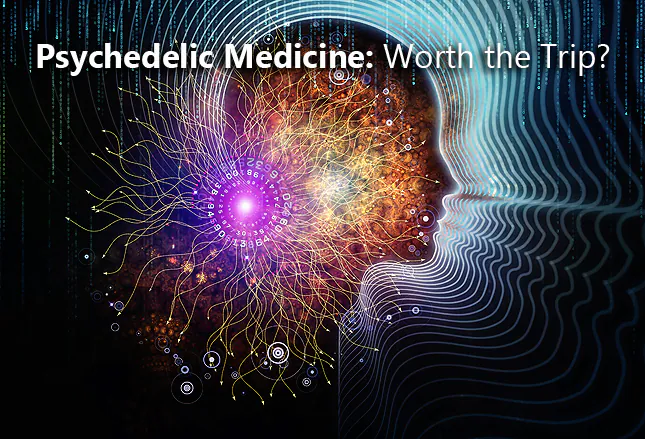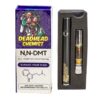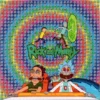Psychedelic medicine and the clinical application of hallucinogens
Although humans have used Psychedelic medicine – hallucinogens ritualistically for thousands of years, interest in their clinical use for the treatment of mental illness began in the 1950s.
When active compounds were first isolated. Restrictive laws came into place in the 1960–70s limiting their medical use and investigation.
Societal stigma further hampered progress and although the legal status of hallucinogens varies globally in much of the world there are restrictions.
And many psychedelic drugs remain illegal worldwide under UN conventions.
With the US Food and Drug Administration granting breakthrough therapy designations for 3,4-methylenedioxy-methamphetamine (MDMA) in 2017 and psilocybin in 2019, we have seen a resurgence of research interest in recent years.
From July 1, 2023, Australia will allow the prescription of MDMA and psilocybin by authorized psychiatrists for treatment-resistant mental illnesses.
How to use Psychedelic medicine
Researchers have implicated psychedelic drugs in the treatment of addiction, anxiety, major depressive disorder, post-traumatic stress disorder, and end-of-life care among others.
Typically complex and difficult-to-treat conditions.
One of the most promising agents is psilocybin, a compound produced by more than 200 species of fungi commonly called magic mushrooms.
The Swiss chemist Albert Hofmann, responsible for synthesizing lysergic acid diethylamide (LSD), isolated psilocybin from Psilocybe mexicana in 1959.
At this time, physicians could purchase pure psilocybin for use in “psychedelic psychotherapy”.
Although we are still establishing the mechanism by which psilocybin works.
A 2022 study suggested that the antidepressant response to psilocybin is associated with a global increase in brain network integration.”
Much of the optimism surrounding psilocybin revolves around the seemingly marked symptom improvements from a single dose, which appear to be long-lasting.
The promise shown in recent clinical trials is exemplified in a placebo-controlled, double-blind, randomized clinical trial (n = 52) in this issue of clinical medicine.
A single dose of psilocybin was assessed alongside psychological support in major depressive disorder.
Patients administered psilocybin had a significantly larger decrease in symptom severity compared with placebo at 14 days.
No serious adverse events were recorded. eClinicalMedicine has also published on psilocybin-assisted group therapy for demoralized, older, long-term AIDS survivors.
This earlier study showed the feasibility, relative safety, and potential efficacy of psilocybin-assisted group therapy.
Additionally, a randomized, double-blind, trial published in the Journal of Psychopharmacology, described the effects of treatment in patients with cancer.
Benefits of Psilocybin therapy
High-dose psilocybin resulted in large decreases in clinical and self-rated measures of depressed mood and anxiety.
Increases in quality of life, life meaning, and optimism as well as decreases in anxiety were also observed and sustained at 6 months.
A further pilot study in tobacco addiction reported an 80% smoking cessation rate at 6 months in those treated with psilocybin compared with the typical rate of less than 35% for other behavioral and pharmacological therapies.
Systematic reviews provide further support with low rates of side effects in studies that adhered to safety guidelines.
Although the evidence of benefit from psilocybin for mental disorders is compelling, safety and ethical concerns have also been raised, especially with larger doses and repeated intake outside of controlled settings.
The unwanted effects of hallucinogens can be potent and can include nausea, vomiting, weakness, confusion, and a lack of coordination.
Other effects include intensified sensory experiences, changes in sense of time, increased blood pressure, loss of appetite, sleep problems, mixed senses, feelings of detachment from self or the environment, panic, and paranoia.
Persistent psychosis might involve visual disturbances, disorganized thinking, paranoia, and mood changes.
Risk associated with using Hallucinogens
Hallucinogen persisting perception disorder involves recurrences of certain experiences, such as hallucinations or other visual disturbances.
While these aspects are concerning, it is important to note that in most studies, adverse events are rare.
Increased risk comes mainly from use outside of controlled conditions in which the dose and formulation cannot be controlled.
These unwanted effects are also often associated with wider substance use over many years and potential contamination.
Lingering effects of psychedelics
In a comment published in The Lancet Psychiatry, investigators and clinicians on three early-phase clinical trials of psilocybin-assisted or MDMA-assisted psychotherapy raised concerns.
They report “letters, emails, and phone calls from concerned individuals who are seeking help while recovering from challenging psychedelic experiences [and] feel harmed by unethical psychedelic providers”.
They also refer to the lingering effects of psychedelics, including increased suggestibility and altered philosophical worldview.
In addition, the authors describe heightened expectations regarding the so-called transformative effects of these drugs.
These reports are concerning; however, strict protocols and ethical practices can help avoid such issues.
Although evidence supports the need for further investigation and more comprehensive trials with psilocybin, we must listen to concerns over side effects.
At the same time, we should observe these concerns for hallucinogenic medicines in the same light as other prescribed medications.
We should hold the same level of scrutiny to all medicines.
For example, dopamine agonists come with the risk of serious secondary effects such as hallucinations.
Common antidepressants and sedatives come with reams of common side effects and painstaking withdrawal.
In fact, nearly all medications come with unwanted secondary effects that can be very concerning and distressing for patients.
Why do we accept these risks for some treatments yet use these side effects as arguments against use in others?
stigma surrounding hallucinogenic medicine
Our current arsenal of treatments for mental illnesses simply does not work well enough and we have a mental health emergency on our hands.
According to World Health Organization, depression is a leading cause of disability; suicide is the fourth leading cause of death among 15–29-year-olds.
And people with severe mental health conditions die as many as two decades early.
The results we have seen with psilocybin are a cause for hope in previously highly complex and difficult-to-treat conditions.
We must now ensure a clear path to establishing reliable protocols, rigorous scientific conduct, and ethical practices to shed the stigma surrounding hallucinogenic medicine.
And we must ensure that funders and researchers do not get discouraged from supporting trials.
We must take steps to protect and regulate the study of psilocybin.
In order to uphold and develop strict and safe treatment regimens.
And the therapy made accessible to all those who need it.
- Psychedelics4 products
- Deadhead Chemist14 products
- DMT9 products
- DMT Vape Pens & Cartridges11 products
- LSD5 products
- Magic Mushrooms18 products
- Mushrooms Grow Kits2 products
- Magic Truffles9 products
- MDMA5 products
- Mushroom Chocolate Bars22 products
- Mushroom Gummies4 products






